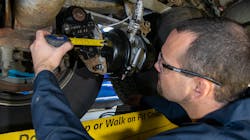Roadcheck 2023 blitz to focus on ABS, cargo securement
Inspectors during International Roadcheck 2023, the 72-hour safety inspection and enforcement blitz across North America set to take place May 16-18, will focus on two areas of the commercial vehicles they examine, anti-lock braking systems (ABS) and cargo securement, the Commercial Vehicle Safety Alliance said this week.
CVSA-certified inspectors in the U.S., Canada, and Mexico will conduct their examinations of commercial vehicles and their drivers at weigh/inspection stations and designated inspection areas along roadways, according to a Feb. 28 release from CVSA, which organizes and conducts the inspection blitz every year. The focus on ABS and cargo securement will highlight their importance to vehicle safety, CVSA said.
See also: Maintenance and repair costs rise, but rate of increase slows
Vehicles found with ABS violations are not eligible to be placed out of service, “but ABS plays a critical role in reducing the risk of collisions by preventing the wheels from locking up or skidding, allowing a driver to maintain control of the vehicle while braking,” according to the CVSA release.
In addition, cargo securement—particularly important on flatbeds and bulk trailers—when done improperly, poses a serious risk to drivers and other motorists by impacting the vehicle’s maneuverability, or worse, causing unsecured loads to come loose, resulting in traffic hazards and vehicle collisions, according to CVSA.
During Roadcheck last year, inspectors put more than 12,000 vehicles and nearly 4,000 drivers out of service during the inspection event, which had wheel ends as its focus. CVSA-certified personnel conducted about 59,000 inspections during that three-day blitz.
Inspections yield a variety of violations
The most common violations on vehicles inspected during Roadcheck 2022 were for brake systems, tires, defective service brakes, lights, and this year's focus, cargo securement. False logs put more than 1,900 drivers out of service, while another 1,000 were cited for driving with the wrong class license. Hours-of-service violations, suspended licenses, and no medical cards rounded out the top five reasons that drivers were cited during the event last May. Vehicle out-of-service rates hovered around 23%, according to results from that event, which were released in September. Roadcheck 2022 saw a 6.4% driver out-of-service rate.
During International Roadcheck 2023 this May, inspectors will conduct their usual roadside safety inspections of vehicles and drivers, according to CVSA. Data will be gathered from those three days and shared later this year as a snapshot of the state of commercial motor vehicles and driver safety.
See also: Fleets moving from preventive to predictive maintenance save more
Roadcheck provides a chance for the public and the trucking industry to be educated about the importance of safe freight-hauling operations and the North American Standard Inspection Program. During a routine North American Standard Level I Inspection, examiners focus on two areas, driver and vehicle safety compliance. They focus on:
- Vehicle safety—Inspectors will ensure the vehicle’s brake systems, cargo securement, coupling devices, driveline/driveshaft components, driver’s seat, fuel and exhaust systems, frames, lighting devices, steering mechanisms, suspensions, tires, wheels, rims, hubs, and windshield wipers are compliant with regulations. Inspections of motorcoaches, passenger vans, and other passenger-carrying vehicles also include emergency exits, seating, and electrical cables and systems in the engine and battery compartments.
- Driver safety—Inspectors will check the driver’s operating credentials, hours-of-service documentation, status in the drug and alcohol clearinghouse, seat belt usage, and for alcohol and/or drug impairment.
Vehicles that pass a Level I or Level V Inspection without any critical vehicle inspection violations may receive CVSA decals, which are valid for three months.
If an inspector does identify critical vehicle inspection item violations, as outlined in the North American Standard Out-of-Service Criteria, the vehicle will be restricted from operating until the identified out-of-service conditions have been corrected. Inspectors may also restrict the driver from operating if he or she is found to have driver out-of-service violations, such as not possessing a valid or necessary operating license or exhibiting signs of impairment.
Law enforcement from cities, states, districts, provinces, and territories in Canada, Mexico, and the U.S. participate in Roadcheck with support from trucking associations and transportation safety organizations, and federal agencies, such as the Federal Motor Carrier Safety Administration, Transport Canada and Mexico’s Ministry of Infrastructure, Communications and Transportation.
About the Author
Scott Achelpohl
Managing Editor
Scott Achelpohl is a former FleetOwner managing editor who wrote for the publication from 2021 to 2023. Since 2023, he has served as managing editor of Endeavor Business Media's Smart Industry, a FleetOwner affiliate.

